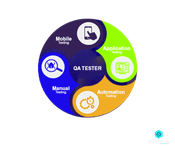Testing is an Infinite Process of Comparing the Invisible to the Ambiguous in order to avoid the Unthinkable happening to the Anonymous.– James Bach
So you are playing a game on your computer, and an error message seems to be continuously popping on your screen, and you are unable to move further. Or, you are trying to visit a web page, but you notice that the website keeps crashing. The issue might be the result of some kind of defect or bug in the software product itself, and it is most likely to cost the makers of that product the anger of its audience. This is definitely not a welcome idea.
So what is the solution? The solution lies in using the expertise of a Quality Assurance Tester who is responsible for preventing, rectifying, and managing such problems. So, how do you become a QA Software Tester? What if you do not have a prior IT background or experience? If so, how to become a Quality Assurance Tester with no experience? Let us find out.
In this blog, we shall try and answer the question of how to become a software QA Tester. We shall seek to understand this question of how to become a Quality Assurance Tester in terms of the requisite qualifications and skills which an individual might require to acquire for grabbing this position. Additionally, we shall consider how to become a QA Software Tester with no experience for those who lack prior experience in the field.
What is a QA Tester?
QA Testers are an integral part of the Software Development Life Cycle (SDLC). They are responsible for assuring quality of software applications and digital products before they are released into the market. They test these products, while they are still in the software development stage, in order to detect possible bugs, mitigate interface issues as well as eliminate chances of poor performance.
Thus, they help in circumventing glitches and avoiding defects in manufactured products before they make it to the market. Quality Assurance Software Testers work in close collaboration with software developers in order to boost effectiveness as well as improve productivity and functionality of the product, while side by side ensuring its quality.
Thus, QA Testers can be understood as Quality Affirmation Specialists who execute an array of tests at different stages of the SDLC and are charged with the responsibility of ensuring convenience and quality assurance of the end product.
Roles and Responsibilities of a QA Tester
A Quality Assurance Tester has the crucial responsibility of supervising each and every stage of the SDLC in order to ensure the adherence of the manufactured product with the quality requirements and company standards. Accordingly, QA Testers have to perform the following tasks in their professional capacity.
- They not only design test plans but also document test progress.
- A QA Tester is responsible for running different types of tests on new products in order to ensure that they fulfill all specifications. They probe the limits of a software, validate functionality, conduct basic operations testing as well as is responsible for quality assurance.
- Writing code to conduct Automation Testing as well as be able to perform Manual Testing.
- They detect and identify bugs as well as execute debugging programs in order to resolve and fix issues.
- They design procedures for product testing as well as research new testing methodologies and testing tools.
- QA Testers function in a cross-functional environment. They work in collaboration with developers in order to evaluate risks, detect operational issues as well as develop strategies for mitigation of the same.
- They drive innovation and efficiency in the software testing field.
- They help in reviewing user feedback.
Becoming a QA Tester?
In this section, we shall answer the question of how to become a Software QA Tester through a rough road map that one can tentatively follow if one happens to be aspiring for the position.
Academic Qualification
As you consider how to become a Software QA Tester, it is important to be clear about the requisite qualifications and education that might be required. A bachelor’s degree is generally recommended, and an overwhelming percentage of QA Testers have one.
If this is not the case, then most QA Testers require a minimum of an associate degree. Additionally, it will important to opt for the right major. Conventionally, it is advisable to get a degree in Mathematics, Computer Science or Engineering. The most common degree that QA Testers aim for is that of Software Engineering.
Acquire Relevant Skills
This step is extremely important and is in fact the answer to the question of how to become a QA Tester with no experience. Even if you happen to lack experience, it is important that you possess certain technical and non-technical skills through technical training which will only increase your chances of landing with a job as a QA Tester.
Accordingly, you should develop proficiency in a few computer languages, especially in some of the most important ones like Python, Java, and C#. You should possess knowledge of different advancement techniques as well as an understanding of a few testing instruments. You should be proficient in Linux, Windows, or UNIX, along with important soft skills like written and verbal communication skills.
Look for an Internship
An internship is essentially offered to freshers and new graduates to provide them with practical professional learning experience in the field. They might be paid or unpaid, and the duration generally varies from a few months to a year. Internships serve as an excellent opportunity for aspiring QA Testers to boost their resumes and even acquire first-hand experience working in the field.
Aim for Certifications
Aspiring QA Testers should give serious thought to acquiring reputed certifications that would showcase their skills and expertise. Two of the most common certifications available for Software Tester (QA) are:
1. Certified Software Tester (CST)
This certification is issued by the International Software Certification Board (ISCB), which, as a body, administers eight varied certifications for Software Testing, Quality Confirmation, and Business Investigation. However, applying for this certification entails the need to possess certain specific requirements like:
- 4-year college education, along with 2 years of involvement in data administrations
OR
- 2 years of degree and four years of experience
OR
- 6 years of experience
Additionally, you will be required to confirm that you have worked within the domain of Software Testing within the recent one and a half year.
2. International Software Testing Qualifications Board (ISTBQ) Certified Tester
This certificate is issued by the American Software Testing Qualifications Board (ASTBQ) and covers two levels: Foundation and Advanced. If you happen to possess this certification, it will definitely be a testimony to your familiarity with the field of Software Testing.
Apply for Jobs
Having acquired relevant qualifications, cultivated the requisite skills, and earned some amount of experience through internships, you could definitely think of applying for different junior QA testing positions. For this, it will be important for you to build connections, carefully craft your resume and cover letter as well as, and be continuously on the lookout for vacancies and openings in different industries.
Moreover, in the capacity of a junior QA Tester, you will be able to work in liaison with QA Engineers and Analysts, as well as Senior QA Testers. This will offer you with the much needed exposure which will only help in adding to your experience and expertise.
?
How to become a QA Tester with No Experience?
In this section, we shall discuss how to become a Quality Assurance Tester; however, we shall do so from the perspective of a person who happens to lack any technical experience in Software Testing in general and QA Testing in particular.
An inherent interest in the field of Technology
In the first place, it is important for you as an individual to be passionate about technology. Irrespective of the background from which you hail, if you seek to enter the domain of Quality Assurance Testing, it will be important for you to have answers to certain concrete questions like why do you want to become a QA Tester in the first place.
Nurture the right skills
As a person who happens to lack appreciable experience in the domain, it will be important for you to cultivate the relevant competencies and expertise that will help you acquire the attention of plausible recruiters. Apart from enrolling for Software Testing courses, you should be on the lookout for ways and means which will help in sharpening your skills. Some of these strategies include:
- Develop in-depth knowledge of SQL.
- Develop proficiency in Performance Testing and understand the differences between different concepts like Stress, Load, Scalability, Volume, and so on.
- Exploit the Developers Tools in your Chrome browser. It is filled with elements from which you can learn a lot, such as cookie management, data traffic, browser speed, local storage, and so on.
- Develop expertise in multiple object-oriented programming languages. Java and Python happen to be the most preferred choices.
- Develop an understanding of Operating Systems as well as Communication Networks.
- You can download and install tools like WireShark, SoapUI, or Postman and try to explore them to the fullest extent possible.
- Develop expertise in working with XML and JSON files.
- Expand your knowledge of web and mobile testing.
- Most importantly, sharpen your skills as an Automation Tester. This would include expertise in conducting automation testing and competencies in opting for the right tools. Automated Testing is only gaining more and more value with the passing of time, and since it is one of the most important components of Software Testing, it is logically expected that as an aspiring Quality Assurance Tester, you should be competent in the same.
Try out different activities
This implies that in order to keep yourself updated, you should keep practising by getting yourself involved in different activities. Some of these might include, freelancing, crowdsourced testing or even taking up Software Testing projects through communities like uTest.
Aim for Certifications
Certifications have become an important criterion in the recruitment process for many organizations. Having one certainly helps boost your chances of landing a QA Tester job by establishing your credentials as a certified tester. So, as you are looking for how to become a Quality Assurance Tester with no experience, you should certainly keep the importance of certifications in mind.
Apply for Jobs
It is difficult to determine the exact point at which you can decide that you have acquired enough skills and are completely job-ready. There is always more to learn. However, when you feel that you have enough expertise at your disposal to compensate for your lack of experience, you should begin applying for relevant QA Tester jobs. The sooner you do begin applying for a job, the sooner you have a chance to acquire a better understanding of what is actually needed from you in the real marketplace.
Conclusion
This blog was specifically divided into two parts, each of which comprehensively dealt with the two questions of how to become a QA Tester and how to become a Quality Assurance Tester with no experience. There is no denying the fact that prior experience or a given technical background can certainly increase your competitive edge; however, a lack of experience is definitely not the end of the world. There are endless possibilities, opportunities, and avenues, making use of which, you can compensate for your lack of experience and land a QA Tester job.
The domain of Software Testing is immensely vast. There do exist multiple niches within the same. As you prepare yourself for the position of a QA Tester, you can equally consider other in-demand positions like that of an SDET. Online boot camps can serve as an attractive choice when it comes to acquiring SDET training right from the comfort of your home.
Be a part of top-notched QA Automation Testing training provided at Syntax Technologies. Enrol now.




